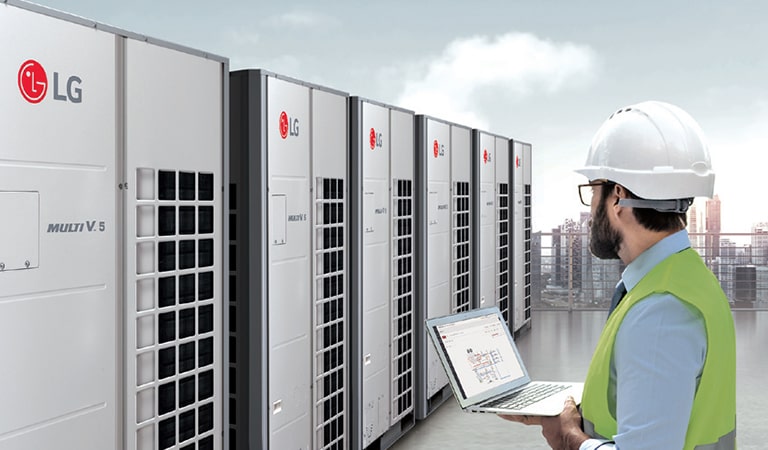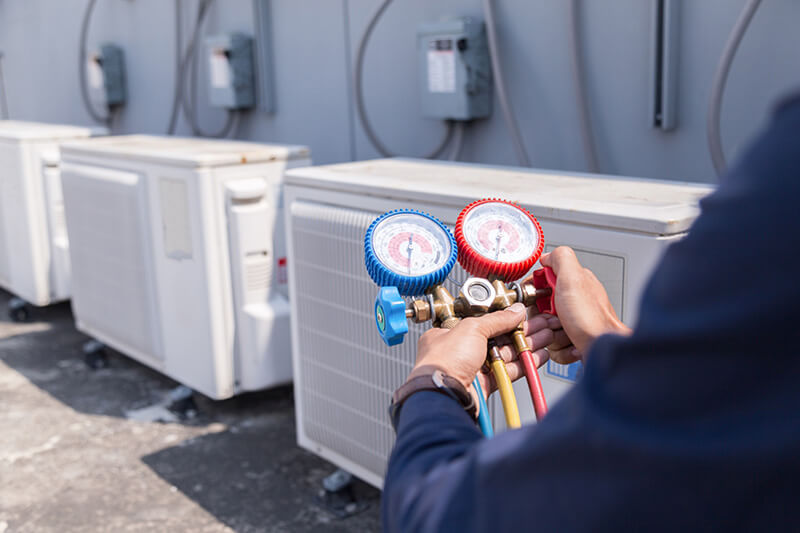Signs of a Quality heat pump installation ooltewah tn
Signs of a Quality heat pump installation ooltewah tn
Blog Article
Picking In Between a Warmth Pump and Heating System: Secret Considerations for Your HVAC Requirements
When assessing heating choices for a/c needs, the decision in between a warm pump and a heating system can be complex. Each system provides unique advantages tailored to specific environments and power effectiveness objectives. Recognizing these distinctions is essential for making an informed choice. Key aspects such as installment expenses and ecological influence further make complex the choice process. Which choice really straightens with one's comfort and sustainability preferences? The adhering to areas will certainly discover these factors to consider in information.
Recognizing Warm Pumps: Exactly How They Work and Their Advantages
While numerous property owners think about different home heating alternatives, understanding just how warm pumps feature and their benefits can significantly affect their choice. Heat pumps operate by transferring warmth instead of producing it. In the wintertime, they remove warm from the outdoors air or ground and move it inside your home, while in the summertime, they reverse this procedure, cooling down the home by removing warmth outside. This twin capability makes them versatile for year-round environment control.One of the primary advantages of heatpump is their energy effectiveness. They utilize substantially much less power contrasted to conventional home heating systems, possibly causing lower energy bills (ductless mini splits). In addition, heatpump have a smaller sized carbon footprint, making them an eco-friendly choice. They also require much less maintenance than traditional systems, adding to long-term price financial savings. Generally, recognizing the technicians and advantages of warmth pumps can aid house owners make notified decisions concerning their home heating and cooling requirements
Exploring Heaters: Kinds, Operation, and Benefits
Heating systems come in various types, including gas, electrical, and oil designs, each with unique operational systems. Understanding these differences is important, as they affect performance and home heating performance. Additionally, heaters supply many advantages, such as consistent heat outcome and integrity in chillier environments.
Sorts of Heaters
Heater can vary significantly in layout and procedure, with furnaces being a prominent selection among house owners. There are several sorts of heating systems, each making use of various fuel resources and innovations. Gas furnaces prevail, leveraging all-natural gas to generate warm effectively. Electric furnaces, on the various other hand, make use of electric resistance to create heat, typically preferred for their uncomplicated installment. Oil heaters, while less common, work in locations with minimal gas access (heat pump installation ooltewah tn). Additionally, condensing heating systems maximize energy efficiency by capturing and recycling exhaust gases. Each type runs via a system of warm exchangers and ductwork to distribute cozy air throughout a home. Recognizing the distinctions in between these heating system kinds is necessary for informed a/c choices
Advantages of Furnaces
For property owners looking for trustworthy heat during cool months, the benefits of heating systems are substantial. Heaters supply constant heating, guaranteeing even temperature levels throughout the home. They are specifically reliable in extreme chilly, typically exceeding heatpump in cold conditions. Numerous kinds, consisting of gas, electrical, and oil heating systems, supply adaptability to satisfy varied demands and preferences.Furnaces additionally have a tendency to have reduced first installment prices contrasted to warm pumps, making them an extra easily accessible choice for lots of. Their robust design adds to a longer life expectancy, with numerous units lasting over 15 years with proper maintenance. Furthermore, modern furnaces are frequently equipped with sophisticated modern technology for enhanced effectiveness, which can cause reduced energy expenses. Overall, heating systems continue to be a reliable choice for effective home heating.

Power Efficiency: Comparing Heat Pumps and Furnaces
When comparing power efficiency in between warm pumps and furnaces, the Seasonal Power Effectiveness Proportion (SEER) plays a vital role in identifying performance. Additionally, a functional expense evaluation discloses the long-term financial implications of each system. Comprehending these elements can lead house owners in making informed decisions concerning their home heating remedies.
Seasonal Energy Performance Ratio
Energy efficiency plays an important duty in the decision-making process between heatpump and heaters, especially when taking into consideration the Seasonal Power Performance Proportion (SEER) This statistics procedures the cooling performance of heatpump over a whole air conditioning period, offering a standardized method to examine efficiency. Higher SEER ratings indicate greater energy effectiveness, converting to reduced power consumption and lowered energy costs. In comparison, heaters are usually examined making use of the Annual Fuel Usage Effectiveness (AFUE) ranking, which reflects heating performance. When contrasting these 2 systems, home owners should prioritize SEER scores for heatpump, as they directly influence overall power savings and environmental sustainability. A thorough understanding of SEER can notably influence the long-lasting contentment and cost-effectiveness of the selected cooling and heating service.
Functional Expense Analysis
Recognizing the functional expenses related to warm pumps and furnaces is crucial for home owners reviewing their choices. Heat pumps generally offer higher power effectiveness, converting electrical power right into warmth with minimal waste. This results in reduced month-to-month energy costs, specifically in moderate climates. On the other hand, typical heaters, especially gas models, might have reduced in advance expenses yet can look at these guys incur higher functional expenditures gradually due to fuel rates and effectiveness ratings.Moreover, heatpump can function as both heating and cooling down systems, possibly lowering the need for different heating and cooling devices. While first financial investments for warmth pumps may be greater, their lasting cost savings in energy performance can make them a more cost-efficient selection for many houses. Careful evaluation of regional energy rates is necessary to establish the very best alternative.
Installment Costs: What to Expect for every Furnace
Installation prices for heater can differ considerably between heatpump and heating systems, influencing property owners' decisions. Heat pumps generally have higher ahead of time installation costs, normally ranging from $3,500 to $8,000, relying on the unit dimension and complexity of installation. This includes the outdoor unit, interior handling system, and essential ductwork alterations. Alternatively, furnaces tend to have lower first expenses, balancing between $2,500 and $6,000, which can be appealing for budget-conscious house owners. Nonetheless, installation expenses can raise if extensive ductwork is required.Moreover, the option of gas type for furnaces-- natural gas, propane, or a knockout post electrical-- can additionally affect setup costs. While heatpump offer power performance, their initial financial investment might discourage some customers. Inevitably, reviewing setup expenses together with lasting financial savings and effectiveness will aid house owners in making informed choices regarding their furnace.
Environment Considerations: Which System Executes Much Better in Your Area
Just how do climate problems influence the performance of furnace? The efficiency of heatpump and heaters can vary substantially depending upon the neighborhood climate. In moderate environments, heatpump stand out by successfully transferring warmth from the outside air, making them an energy-saving option. Nevertheless, their effectiveness lessens in extremely chilly temperature levels, where they may battle to draw out sufficient warm. Alternatively, furnaces, specifically gas versions, provide reputable and constant warmth regardless of outside problems, making them preferable in colder regions.In locations that experience milder winters months, heatpump can operate properly year-round, providing both heating and cooling. On the other hand, regions with severe wintertimes often take advantage of the toughness of heating systems. Eventually, understanding the local climate is vital when making a decision in between a heat pump and a heater, as it straight impacts their functional performance and overall performance.
Maintenance Demands: Long-Term Take Care Of Warmth Pumps vs. Furnaces
While both warmth pumps and furnaces call for routine maintenance to ensure peak performance, their details requirements and care routines differ considerably. Heating systems usually need less frequent focus, with annual inspections sufficing to look for gas leakages, clean filters, and analyze general functionality. Their less complex layout usually enables straightforward repairs.In contrast, heatpump demand biannual upkeep due to their twin function in cooling and heating. This includes cleansing coils, checking refrigerant degrees, and making sure that both the outdoor and indoor devices operate at their best. Furthermore, warmth pump maintenance commonly involves more detailed elements, making specialist servicing essential.Neglecting upkeep can bring about decreased performance and enhanced power costs for both systems. Eventually, property owners need to think about these long-lasting treatment requirements when selecting in between a heatpump and a heater, as proactive maintenance can prolong the life-span and performance of either system significantly.
Ecological Influence: Choosing a Sustainable Heating Choice
The ecological impact of heater is a crucial assessment for homeowners seeking sustainable choices. Heatpump are generally more energy-efficient than typical furnaces, as they move warm as opposed to produce it, greatly decreasing carbon discharges. By using eco-friendly power resources, such as geothermal or air-source warmth pumps, homeowners can even more reduce their ecological footprint.On the various other hand, gas furnaces give off greenhouse gases and contribute to air contamination, though they usually provide greater warm outcome. Advancements in innovation have actually led to the growth of high-efficiency furnaces that lessen emissions.Ultimately, picking a home heating system includes evaluating efficiency versus environmental impact. Homeowners are urged to assess neighborhood energy resources and rewards for eco-friendly systems, making certain a selection that aligns with both individual comfort and ecological duty. The decision influences not just immediate convenience however likewise long-term sustainability and ecological health.
Regularly Asked Inquiries
The Length Of Time Do Heat Pumps and Furnaces Typically Last?
The life-span of heat pumps commonly ranges from 15 to two decades, while furnaces can last in between 15 look at this now to three decades. Routine maintenance substantially impacts their long life and efficiency in supplying heating remedies.
Can I Use a Heatpump in Extremely Cold Climates?
Warmth pumps can operate in exceptionally cold climates, yet their efficiency reduces as temperature levels decline. In such problems, supplemental heating sources might be required to preserve comfortable interior temperature levels and guarantee peak performance.

What Is the Noise Degree of Warm Pumps Versus Furnaces?
The noise levels of heat pumps and furnaces vary considerably. Normally, heatpump run more silently than standard furnaces, making them more effective for those conscious seem, while furnaces might create louder operational sounds during home heating cycles.
Are Warmth Pumps Suitable for Both Heating & Cooling?
Heatpump are undoubtedly suitable for both cooling and heating (heat pump installation ooltewah tn). They operate by moving heat, giving effective temperature control year-round, making them a functional option for homeowners looking for an all-in-one a/c service
What Dimension Furnace Do I Need for My Home?
Determining the ideal size heater for a home requires evaluating aspects such as square video, insulation quality, local climate, and the home's design. Consulting a specialist can ensure an accurate evaluation and excellent convenience. Warm pumps generally use greater power efficiency, converting electric energy into warm with very little waste. In modest environments, heat pumps stand out by effectively moving heat from the outdoors air, making them an energy-saving choice. Conversely, heating systems, particularly gas versions, give reputable and constant heat regardless of outdoor conditions, making them preferable in colder regions.In areas that experience milder wintertimes, warmth pumps can run properly year-round, giving both heating and cooling. Warmth pumps are generally a lot more energy-efficient than standard heating systems, as they move heat rather than generate it, greatly decreasing carbon exhausts. By using sustainable energy sources, such as geothermal or air-source heat pumps, homeowners can further reduce their ecological footprint.On the various other hand, all-natural gas heaters produce greenhouse gases and contribute to air contamination, though they frequently supply higher heat result.
Report this page